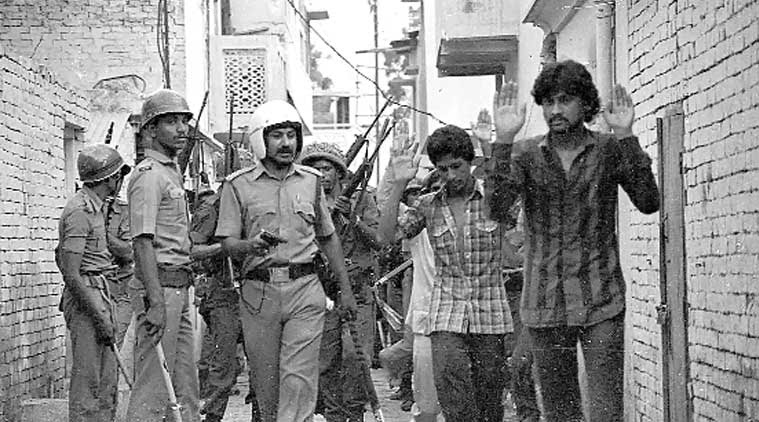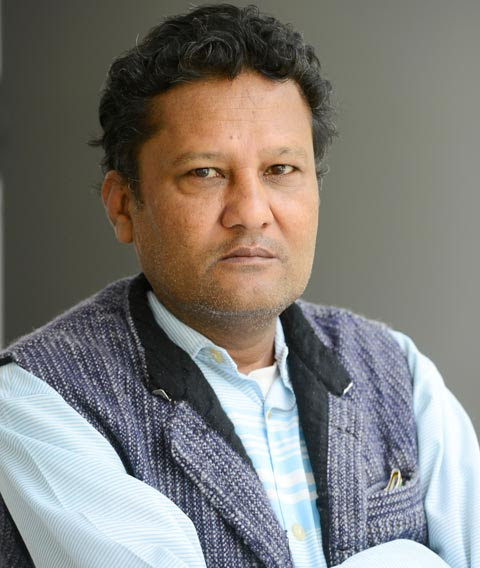Tuesday, March 24, 2015
1987 Hashimpura massacre: The photographs that stand witness: Express News Service - The Indian Express
http://indianexpress.com/
 ‘When the Army completed its search operation, it handed the men over to the Provincial Armed Constabulary... The PAC men kept threatening the public at gunpoint.’
‘When the Army completed its search operation, it handed the men over to the Provincial Armed Constabulary... The PAC men kept threatening the public at gunpoint.’
 ‘While conducting the search, Army men were beating up the young men with their fists and rifle butts.’
‘While conducting the search, Army men were beating up the young men with their fists and rifle butts.’ ‘They were pleading with the Army to leave their men alone.’
‘They were pleading with the Army to leave their men alone.’
The Indian Express
1987 Hashimpura massacre: The photographs that stand witness

By: Express News Service | Updated: March 24, 2015 5:35 pm
Photojournalist Praveen Jain was in Hashimpura on May 22, 1987, where he saw a PAC and Army crackdown unfold. Some of the photos he clicked would go on to serve as prosecution evidence against PAC men accused of massacring civilians and since acquitted by a court. Jain, Associate Photo Editor with The Indian Express, recounts what he saw that day.
 ‘While conducting the search, Army men were beating up the young men with their fists and rifle butts.’
‘While conducting the search, Army men were beating up the young men with their fists and rifle butts.’
There is this one image that has remained in my memory ever since I saw it. As Army men barged into a Muslim home and dragged the men out one by one, a little boy ran in fear, then suddenly stopped and started offering namaaz — he was turning to the almighty for help. Looking at the child’s face, I could sense how helpless he was feeling. I don’t know what the child’s fault was.
 ‘They were pleading with the Army to leave their men alone.’
‘They were pleading with the Army to leave their men alone.’
It was the morning of May 22, 1987. I was then with Sunday Mail, working as chief photographer. I had been asked to go to Meerut; I was told that there were communal clashes there. Until then, it was only an assignment.
When I reached Meerut, a police officer told me, “Why you are here? Go visit Hashimpura mohalla (part of Meerut city). That is the place where the Army is conducting its search operation.” That is when I reached Hashimpura.
RELATED
The moment I entered the mohalla, the tension was noticeable. Army men were marching in groups. Young men were being dragged out of their homes. I took my Canon in my hands and started clicking photos. What was very disturbing was the sight of the distraught women. Standing on their terraces, they were shouting at the Army men, pleading with them to leave their men alone. Not one woman came out on the street, though.
As the operation got more and more intense, it soon became apparent that things were getting risky even for me. I had to hide inside a Muslim family’s house. Today, I cannot remember the name of the family. The Army by then had started entering almost every home. They were conducting their search very fast.
It was mostly the young men who were dragged out. And while conducting the search, Army men were beating them up with their fists and rifle butts. As I was trying to capture one of these pictures, one of the Army personnel saw me and tried to stop me. He asked me to leave. As far as I can remember, I was stopped twice but I did click my pictures, hiding at different places at different times. When the Army completed its search operation, its personnel handed the men over to the Provincial Armed Constabulary.
When I moved out of the house where I was hiding, I saw some men being told to kneel down, others being dragged out, and some others being brutally beaten up. All through, the PAC men kept threatening the public at gunpoint. By then, I had taken more than 15 photographs.
These men were taken to the main road outside the mohalla and made to kneel there. They were all asked to put their hands up. I quickly captured another set of photos. The trucks had already arrived. The young men were segregated from the group and told to get into the trucks. I thought these were preventive arrests. At that point, I thought these men were being taken away to maintain some peace, as curfew had been clamped in Meerut.
It was a three-hour assignment. I then returned to Delhi. It was only after I got back that I got to hear about how Muslim men had been killed in Meerut that day.
First Published on: March 24, 201512:00 am
White House Chief of Staff Denis McDonough Says the Israeli Occupation 'Must End' : Jessica Schulberg - Huffpost India
http://www.huffingtonpost.com/
24 March 2015
Edition: IN
· Email
·
·
White House Chief of Staff Denis McDonough Says the Israeli Occupation 'Must End'
Posted: 24/03/2015 02:59 IST Updated: 24/03/2015 10:29 IST
WASHINGTON -- White House Chief of Staff Denis McDonough brought a strong message to an American pro-Israel conference on Monday, telling a crowd of 3,000 attendees that “an occupation that has lasted for almost 50 years must end, and the Palestinian people must have the right to live in and govern themselves in their own sovereign state.”
The annual conference, hosted by J Street, fell at a nearly unprecedented low point in U.S.-Israeli relations. Existing tensions between President Barack Obama and Prime Minister Benjamin Netanyahu came to a head in the recent Israeli elections, when Netanyahu campaigned on a promise that he would not allow for the creation of a Palestinian state. Though he has since tried to reaffirm his support for a two-state solution, the White House has rejected his reversal.
“After the election, the prime minister said that he had not changed his position, but for many in Israel and in the international community, such contradictory comments call into question his commitment to a two-state solution -- as did his suggestion that the construction of settlements has a strategic purpose of dividing Palestinian communities and his claim that conditions in the larger Middle East must be more stable before a Palestinian state can be established,” McDonough said.
“We cannot simply pretend that those comments were never made, or that they don’t raise questions about the prime minister’s commitment to achieving peace through direct negotiations,” McDonough added, saying that the Obama administration plans to reevaluate its policy toward Israel and the Palestinian territories.
Though McDonough did not elaborate on what a revamped policy would look like, the White House has suggested that its opposition to Palestinian attempts to secure statehood at the United Nations may soften. On Thursday, White House spokesman Josh Earnest told reporters, “Steps that the United States has taken at the United Nations have been predicated on this idea that the two-state solution is the best outcome. Now our ally in these talks has said that they are no longer committed to that solution. That means that we need to reevaluate our position in this matter, and that is what we will do moving forward,” referring to past down-votes by the U.S. on Palestinian statehood initiatives.
While the relationship between Obama and Netanyahu has been strained since the American president’s early days in office, both leaders, at least officially, have supported a negotiated two-state solution to the Israeli-Palestinian conflict. Now that the Obama administration is operating under the assumption that Netanyahu has no intention of supporting a Palestinian state, the White House has been increasingly unrestricted in its criticism of the Israeli occupation of the Palestinian territories.
“Palestinian children deserve the same right to be free in their own land as Israeli children in their land. A two-state solution will finally bring Israelis the security and normalcy to which they are entitled, and Palestinians the sovereignty and dignity they deserve,” McDonough told a cheering crowd of J Street conference attendees, who overwhelmingly identify with the Jewish left.
The chief of staff said that the parameters of a two-state solution are clear. “The borders of Israel and an independent Palestine should be based on the 1967 lines with mutually agreed swaps. Each state needs secure and recognized borders, and there must be robust provisions that safeguard Israel’s security,” he said, mentioning baseline borders that Netanyahu has repeatedly refused, citing security concerns.
On Sunday, Israeli Ambassador to the U.S. Ron Dermer attempted to justify Netanyahu’s controversial pre-election comments by explaining that ending the occupation would compromise Israeli safety.
“Right now, if we establish a Palestinian state on the West Bank on Judea-Samaria, we are going to see another armed terror base used to launch attacks against Israel,” he said on NBC’s “Meet the Press.”
“Remember, Israel left Lebanon in 2000. We didn't get peace, we got an Iranian terror base out on the northern border. Israel left Gaza in 2005, we uprooted all the settlements there. We didn't get peace, we got an Iranian terror base on our southern base,” Dermer said.
During his remarks at J Street, McDonough pushed back against the notion that the U.S. was promoting a solution that would jeopardize Israeli security. “We share Israel’s concern about the security environment in the region -- which is why, as part of the last round of talks, the president and Secretary Kerry had General John Allen prepare a detailed plan to provide for security in the West Bank over the long term,” he said.
McDonough added, “Nothing would do more to improve Israel’s security or its relations with its neighbors than to bring about a sovereign and contiguous Palestinian state alongside a secure, democratic, Jewish Israel.”
Despite his harsher-than-usual words for the Israeli leadership, McDonough stressed that the U.S. will continue to ensure that Israel has a stronger military than any of its neighbors. He reminded his audience that the U.S. delivered immediate emergency funding of $225 million for Israel’s Iron Dome missile defense system during last summer’s Gaza War, in addition to nearly $1 billion in funding already in place for the system.
Next year, McDonough added, Israel will receive F-35 Joint Strike Fighter jets, making it the only country in the Middle East that will be armed with the highly advanced aircraft.
Near the end of his remarks, McDonough shifted to Iran, referencing congressional attempts to pass legislation that would empower lawmakers to vote on a final nuclear agreement and strip the president of the ability to temporarily lift sanctions.
“Let’s be very clear about what this would do,” said McDonough, who recently drafted a letter to Senate Foreign Relations Committee Chairman Bob Corker (R-Tenn.), urging him to hold off on putting the bill to a vote. “It would embolden hard-liners in Iran. It would separate the United States from our allies. And it would potentially fracture the international unity that has been essential to keeping the pressure on Iran. In other words, this legislation could cause the United States to be blamed if diplomacy fails."
Subscribe to:
Comments (Atom)

